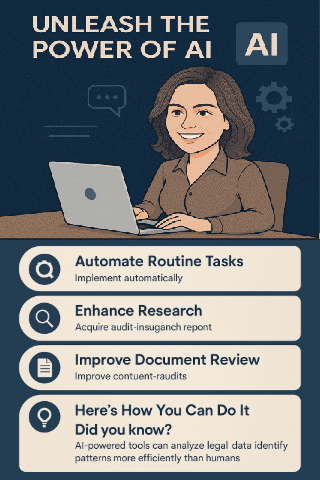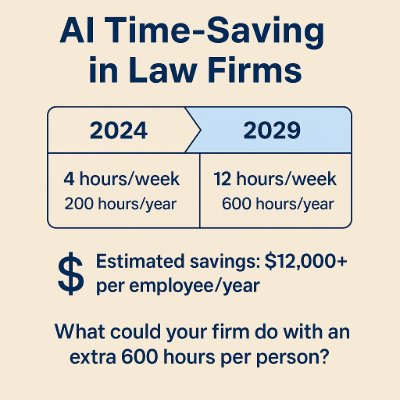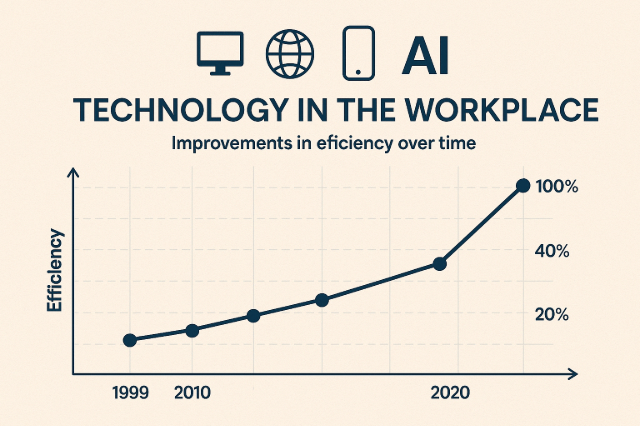An insight study by Thomson Reuter in combination with a post by The Business Journal about “How AI is reshaping the legal field”
In March 2025, the Triangle Business Journal featured an article about a Thomson Reuters study that spotlighted the law firm of James Scott Farrin—one of the top 25 law firms in the Triangle area. The survey highlights how law firms are integrating AI into their workflows, reflecting the growing role of technology in enhancing efficiency and legal services.
Among the professionals featured in the survey was Jennifer Horn, a seasoned litigation paralegal and operations analyst at James Scott Farrin. Initially skeptical about using AI in her work, Horn became a strong advocate after seeing how the technology could improve efficiency and ease her workload—quickly turning concerns into confidence.
Fix me some data..AI did not understand the Carolina “southern” slang. , at first!.
When Jennifer Horn first started communicating (prompting) with artificial intelligence (AI), it didn’t come easy partly because she wasn’t familiar with how to ‘talk’ to AI. As she joked, it didn’t seem like AI spoke “southern”.
Prompting with AI – For Best Results and Answers – Be Structured and Clear!
After an attorney showed Jennifer how to structure prompts more effectively, everything changed. Now, she’s not only confident using AI but one of its strongest advocates at the firm. AI started helping streamline tasks and improve efficiency, showing that even the most skeptical professionals can benefit from embracing this technology.
In short, AI gets to work by learning from data, applying algorithms to recognize patterns, and automating processes to help humans work more efficiently.
Law firms adopting AI at the expected pace, Reuters predicts that legal professionals could save four hours per week per person in 2024—amounting to up to 200 hours per year. Within five years, that number is expected to triple to 12 hours per week, translating to an impressive 600 hours saved per person annually.
Mastering the Art of Prompting: How to Ask, Learn, and Teach AI
AI’s job is to learn from it’s users Horn says and she feels it appealing that she has the ability to train AI in her preferred way of doing things. AI can be a tool that complements human expertise! AI it’s here to make you more efficient and enhance your skills! AI is designed to learn from you, adapting to your preferences and workflow.
Horn likens AI to having an extra set of eyes—one that helps spot important details faster and directs her attention to areas that need further review. “It’s like having a second opinion that works much quicker,” Horn said.
- AI started improving efficiency, showing that even the most skeptical professionals can benefit from embracing this technology.
- AI serves as a powerful tool in the legal profession, streamlining tasks like medical record summarization.
AI: Enhancing the Work of Paralegals, Not Replacing Them!
“For a paralegal, it’s truly mind-blowing what AI can do,” said Jennifer Horn. “At first, I thought, ‘Oh no, is AI going to take my job?’ But now, I can confidently say it’s not going to replace the human element of what we do. AI can’t do 100% of our work—it’s not capable of replacing the intuition, empathy, and judgment we bring to the table.”
The shift towards AI aligns with broader trends in the profession. According to Thomson Reuters’ “Future of Professionals Report,” half of all law firms now rank AI exploration and implementation as their top priority as of mid-2024. Additionally, nearly 72% of legal professionals view AI as a “force for good,” recognizing its potential to enhance efficiency, accuracy, and client outcomes.
Technology adoption has always been a priority at James Scott Farrin and now, the firm is setting its sights on becoming a leader in AI-powered solutions—a move that’s quickly becoming the new standard in the legal industry.
AI is more than an upgrade: it’s a strategic advantage!
In a field built on precision, speed, and judgment, AI is not a replacement — it’s reinforcement. For firms like James Scott Farrin, it’s more than an upgrade: it’s a strategic advantage.
Paralegals at firms like James Scott Farrin are actively involved in ‘training’ the AI systems they use. This includes setting tone preferences, formatting standards, and accuracy benchmarks so the AI aligns with firm expectations.
As one of the 10 largest law firms in the Triangle and among the top 25 in North Carolina, James Scott Farrin has long been an early adopter of cutting-edge technology. Now, the firm is positioning itself at the forefront of AI innovation in the legal industry.
Whether you’re a busy professional or just someone looking to save time, AI can help make everyday tasks faster and easier.
Takeaway
AI doesn’t practice law — but it helps lawyers and their teams do their jobs better, faster, and with fewer repetitive steps. Think of it as a partner: always on, always learning, and tuned to your preferences.
While AI can draft documents and analyze records, it still relies on human direction. The nuances of legal judgment, empathy toward clients, and the ability to navigate unpredictable scenarios remain uniquely human. In fact, paralegals who understand how to direct AI effectively are becoming more valuable — not less.
Here’s how AI helps:
- Drafts medical summaries based on your format
- Flags missing information in documents
- Suggests legal citations (you still choose what’s relevant)
- Speeds up intake forms and client questionnaires
- Assists with consistent formatting, style, and repetition
If you’d like insights without the fluff—and the occasional tip that might save you from another 12-hour billing day—subscribe to my newsletter. I’ll keep it relevant, practical, and worth your docket time.








